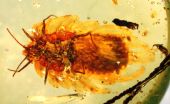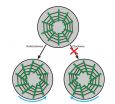(Press-News.org) PHILADELPHIA - HIV (human immunodeficiency virus)-positive kidney transplant patients experienced superior outcomes when compared to kidney transplant patients with Hepatitis C and those infected with both HIV and Hepatitis C, according to a study led by researchers at the Perelman School of Medicine at the University of Pennsylvania and published online in Kidney International.
The research team examined outcomes of 124,035 adult kidney recipients transplanted between 1996 and 2013, and found the three-year survival rate of HIV patients (89 percent) was actually very similar to those of the uninfected patient reference group (90 percent). However, the three-year survival rates for Hepatitis C patients (84 percent) and HIV/Hepatitis C co-infected patients (73 percent) were notably lower. The findings represent the largest retrospective to date study of outcomes in adult kidney transplant recipients with HIV.
HIV patients are required to have an undetectable viral load in order to receive a kidney transplant, but the same virus-free requirement isn't applied to Hepatitis C-infected patients. In addition, less than 25 percent of centers in the United States offer kidney transplant to HIV patients and overall, fewer HIV patients receive kidney transplants than non-infected groups and Hepatitis C patients.
"These findings show that HIV patients are being unfairly perceived to have worse kidney transplant outcomes than non-infected groups, and as a result, they often have to wait the longest for transplants and there are fewer living donors," said lead author Deirdre Sawinski, MD, assistant professor in the division of Renal, Electrolyte and Hypertension. "Our hope is that these study findings result in greater access to transplantation for HIV patients, while also inspiring the kidney transplant community to focus on eradicating Hepatitis C in transplant patients -- either pre-transplant or if that's not possible, immediately post-transplant -- to ensure better outcomes for these patients."
Current guidelines recommend kidney transplantation as the preferred course of treatment for Hepatitis C patients, as compared to continued dialysis; however, these patients experience worse outcomes than their uninfected counterparts. So now, with the recent approval of new, direct-acting Hepatitis C antiviral agents, doctors may be better able to treat the virus either before or just after transplant.
INFORMATION:
The other study authors, all of whom are from Penn, include Kimberly A. Forde, MD, MHS, Kevin Eddinger, Andrea B. Troxel, ScD, Emily Blumberg, MD, Pablo Tebas, MD, Peter L. Abt, MD, and Roy D. Bloom, MD. The study was funded in part by Health Resources and Services Administration contract 234-2005-370011C. Sawinski is supported by the Penn Center for AIDS Research (P 30 A1 045008), and Forde is supported by the National Institutes of Health/National Institute of Diabetes and Digestive and Kidney Diseases (DK090209).
Penn Medicine is one of the world's leading academic medical centers, dedicated to the related missions of medical education, biomedical research, and excellence in patient care. Penn Medicine consists of the Raymond and Ruth Perelman School of Medicine at the University of Pennsylvania (founded in 1765 as the nation's first medical school) and the University of Pennsylvania Health System, which together form a $4.9 billion enterprise.
The Perelman School of Medicine has been ranked among the top five medical schools in the United States for the past 17 years, according to U.S. News & World Report's survey of research-oriented medical schools. The School is consistently among the nation's top recipients of funding from the National Institutes of Health, with $409 million awarded in the 2014 fiscal year.
The University of Pennsylvania Health System's patient care facilities include: The Hospital of the University of Pennsylvania -- recognized as one of the nation's top "Honor Roll" hospitals by U.S. News & World Report; Penn Presbyterian Medical Center; Chester County Hospital; Penn Wissahickon Hospice; and Pennsylvania Hospital -- the nation's first hospital, founded in 1751. Additional affiliated inpatient care facilities and services throughout the Philadelphia region include Chestnut Hill Hospital and Good Shepherd Penn Partners, a partnership between Good Shepherd Rehabilitation Network and Penn Medicine.
Penn Medicine is committed to improving lives and health through a variety of community-based programs and activities. In fiscal year 2014, Penn Medicine provided $771 million to benefit our community.
Inhalable particles include all particulate matter with a diameter smaller than 10 micrometers (PM10). In this group a distinction is made between even finer particles smaller than 2.5 micrometers (PM2.5) in diameter, which can deeply enter the lung, and ultrafine particles with diameters less than 0.1 micrometers (100 nanometers), which can also enter the blood stream.
The research team at Helmholtz Zentrum München led by Prof. Dr. Annette Peters, head of the research program Epidemiology at the German Center for Diabetes Research (DZD), and Dr. Alexandra Schneider ...
Scientists at the John Innes Centre have discovered why the first buds of spring come increasingly earlier as the climate changes.
Dr Steven Penfield at the JIC found that plants have an ideal temperature for seed set and flower at a particular time of year to make sure their seed develops just as the weather has warmed to this 'sweet spot' temperature.
Dr Penfield, working with Dr Vicki Springthorpe at the University of York, found the sweet spot for the model plant Arabidposis thaliana is between 14-15?C. Seeds that develop in temperatures lower than 14?C will almost ...
Saurichthys is a predatory fish characterized by a long thin body and a sharply pointed snout with numerous teeth. This distinctive ray-finned fish lived in marine and freshwater environments all over the world 252-201 million years ago during the Triassic period. Two new species of this extinct fish have been discovered by paleontologists at the University of Zurich, working in collaboration with researchers in Germany and China. The first species, «Saurichthys breviabdominalis», is named for its relatively short body and the second, «Saurichthys rieppeli», ...
Darwin's evolutionary theory predicts survival of the fittest. So why do different survival tactics co-exist, if evolution should always favour the winning strategy?
To answer that question scientists at the Universities of Bath and Manchester have been studying a single-celled amoeba, also known as slime mould, which displays certain behaviours that have been labelled as "cheating" or "cooperating".
In a study, published in the prestigious journal Current Biology, the team found that cheaters don't necessarily win in terms of overall survival, suggesting that biologists ...
Scientists at the University of Bonn, together with colleagues from China, UK and Poland, have described the oldest evidence of brood care in insects: it is in a female scale insect with her young that is encased in amber as a fossil. The approximately100-million-year-old "snapshot" from the Earth's history shows the six millimetre long tiny insect with a wax cocoon, which protected the eggs from predators and drying out plus associated young nymphs. The researchers are now presenting their results in the respected journal eLIFE.
The small female insect with the waxy ...
Face recognition security on smartphones can be significantly improved if users store an 'average' photo of themselves, according to new research by scientists at the University of York.
A research team led by Dr David Robertson, of the Department of Psychology's FaceVar laboratory at York, found that combining different pictures of the user, rather than a single 'target' image, leads to much better recognition across all kinds of daily settings. The research is published in the journal PLOS ONE.
The researchers examined the performance of the 'face unlock' system ...
Researchers at the Mechanobiology Institute (MBI) at the National University of Singapore have discovered that the inherent 'handedness' of molecular structures directs the behaviour of individual cells and confers them the ability to sense the difference between left and right. This is a significant step forward in the understanding of cellular biology. This discovery was published in Nature Cell Biology on 23 March 2015.
Cellular decision making
Our bodies are made up of hundreds of different types of cells, each of which performs a unique and highly specialized ...
Researchers from the UK and Malaysia have detected a human fingerprint deep in the Borneo rainforest in Southeast Asia. Cold winds blowing from the north carry industrial pollutants from East Asia to the equator, with implications for air quality in the region. Once there, the pollutants can travel higher into the atmosphere and impact the ozone layer. The research is published today in Atmospheric Chemistry and Physics, an open access journal of the European Geosciences Union (EGU).
Rainforests are often associated with pure, unpolluted air, but in Borneo air quality ...
WASHINGTON-- The Society for Public Health Education (SOPHE) proudly announces the publication of a Health Education & Behavior (HE&B) supplement devoted to the latest research and practice on policy and environmental approaches to foster healthy communities. The April 2015 supplement, "The Evidence for Policy and Environmental Approaches to Promoting Health," comprises a dozen peer-reviewed articles and two perspectives examining the state-of-the-evidence on what's working and what's needed at the community, institutional and societal levels to promote good health across ...
A world first study revealing the presence of two antibodies in a sub-group of children experiencing their first episode of psychosis affirms a longstanding recognition that auto-immune disorders play a significant role in psychiatric illness.
Antibodies defend the body against bacterial, viral, and other invaders but sometimes the body makes antibodies that attack healthy cells. In these cases, autoimmune disorders develop. These include conditions such as multiple sclerosis (MS), rheumatoid arthritis and Type 1 diabetes.
This 'immune hypothesis' is supported by new ...





